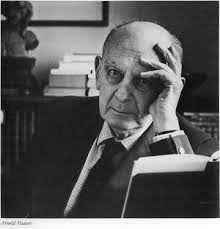Hauser, Arnold

Bio: (1892-1978) Hungarian art historian and sociologist. Arnold Hauser received his doctorate in art history from the University of Budapest, where he became a member of an intellectual circle that gathered Hungarian intellectuals such as Lukács and Mannheim. After he left Budapest, he lived and worked in Berlin and Vienna, and after the Nazis came to power in Austria, he emigrated to Great Britain, where he taught at several universities. Hauser was also a visiting professor at several universities in the USA. Towards the end of his life, he returned to Hungary, where he remained until his death.
Hauser is significant for sociology because he saw very early on that there is a close connection between social structures and processes, on the one hand, and art and literature, on the other hand, so it is necessary to sociologically study art, literature, and their historical development. The main tenets of Hauser's sociology of art are presented in the books Social History of Art and Literature (1951), The Philosophy of Art History (1958a), and Sociology of Art (1974). The first two books are heavily influenced by Marxism and historical materialism, while in the book Sociology of Art, the author distanced himself from doctrinal Marxism.
Main works
The Social History of Art (1951);
The Philosophy of Art History (1959, in German 1958);
Methoden moderner Kunstbetrachtung (1958);
Mannerism: The Crisis of the Renaissance and the Origin of Modern Art (1986, in German 1964);
Art and Society (1972);
Sociology of Art (1985, in German 1974).

